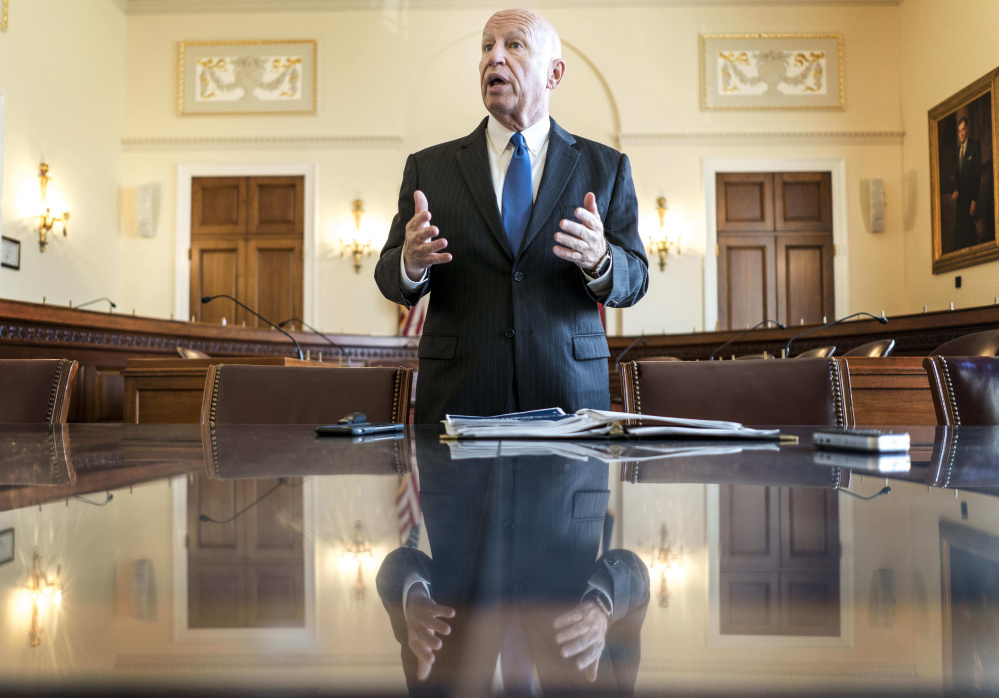WASHINGTON — House Republicans grappled Friday with the difficulty of turning their new tax plan into law, making a change that would make the proposal’s tax cuts for individuals less generous and entertaining a controversial proposal from President Trump to use the tax bill to repeal a central element of the Affordable Care Act.
Republicans changed the tax overhaul, which was announced Thursday, to cut $81 billion from the tax breaks it would provide to individual taxpayers. The move was made as lawmakers realized their initial effort would run up against the $1.5 trillion in total borrowing over a decade that Congress had authorized to finance the tax cut plan.
Party leaders also took a preliminary step to study Trump’s proposal to include language in the tax bill that would scrap the Affordable Care Act’s individual mandate, a change nonpartisan analysts say would save the government more than $400 billion over a decade but would also leave 15 million more Americans without health insurance.
Republicans released their proposal overhaul of the personal and corporate tax code on Thursday after months of negotiations, but Friday’s last-minute changes showed how challenging it would be to finalize the law by year’s end.
The decision to reduce benefits for individual taxpayers threatens to reinforce perceptions the bill is tilted toward helping the wealthy and corporations at the expense of middle-class Americans.
Republicans plan to save the $81 billion over a decade by changing the way the bill measures inflation, a shift that would move taxpayers into higher-tax brackets more quickly and probably hit middle-class taxpayers harder than the very wealthy.
Undermining the Affordable Care Act through a tax overhaul, meanwhile, would probably draw the same type of opposition that earlier efforts did in the Senate, dooming several such attempts to repeal Obamacare earlier this year. Many in Congress say such an effort would destroy Republicans’ chance of passing major legislation this year.
Still, under heavy pressure from Trump, House Ways and Means Committee Chairman Kevin Brady, R-Texas, said he would ask the Congressional Budget Office to assess the implications of repealing the individual mandate as part of tax reform, the first step toward including the proposal in the bill.
“The president feels very strongly about including this at some step before the final process,” Brady said at a Friday event hosted by Politico. “He’s told me that twice by phone and once in person.”
Brady also suggested he was unlikely to ultimately adopt the change Trump had personally pushed him to make, noting the possibility such a change would sink the bill’s hopes in the Senate.
“Importing health care into the tax reform debate has consequences, especially when the Senate has yet to produce 50 votes on anything related to health care that I’m aware of,” he said. “Clearly you’re bringing a whole new element into pro-growth tax reform.”
Trump remains enamored with the idea, driven by conversations with Sen. Tom Cotton, R-Ark., and Sen. Rand Paul, R-Ky., who are aggressively promoting it.
House conservatives are pushing – gently, for the moment – to include the mandate’s repeal in the tax legislation.
“It’s good policy. It’s the right thing to do,” Rep. Jim Jordan, R-Ohio, a leader of the Republicans’ hard-right bloc, said Friday. “I don’t know why we wouldn’t.”
Brady said other additional, “more substantive” changes to the bill are coming Monday.
Broadly, the Republican tax bill would sharply lower the corporate tax rate from 35 percent to 20 percent and cut income tax rates on all levels of income below $1 million. It would also expand some targeted tax benefits, particularly for corporations. To offset the revenue lost because of those cuts, the bill would also eliminate deductions individuals and businesses have relied on for decades – changes that promise to spark both internal tumult in the Republican Party and intense lobbying pressure from powerful industries and interest groups.
Some changes were immediately controversial, especially a plan to limit a provision in current tax law that allows homeowners to deduct interest payments made on their mortgages.
But there were indications Friday the sharp internal divisions over a separate proposal to scale back an existing break that allows individuals to deduct tax payments made to state and local governments from their federal tax liability could be easing. The bill would still let taxpayers deduct up to $10,000 in property taxes, though it would eliminate the ability to deduct any state income tax paid.
That compromise appears to have appeased many of the initial holdouts. While a handful of Republican members from New York and New Jersey said they would oppose the bill as written, one key member who had negotiated a compromise with leadership declared Friday that he was satisfied.
Send questions/comments to the editors.



Comments are no longer available on this story